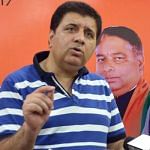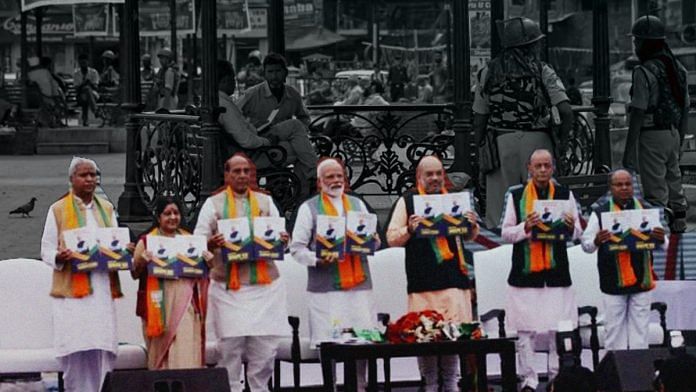PM Narendra Modi Tuesday said that Articles 370 and 35A act as hindrance in the development of J&K, where people ‘want a change’. From calling for a debate in 2013 to now accusing opposition leaders of seeking two PMs in India, Modi has consistently kept the J&K special status issue alive, including in this election campaign.
ThePrint asks: With Article 35A debate, is Kashmir more about domestic politics & less about strategic interests?
Abrogating Articles 35A & 370 tantamount to making J&K’s relation with the Union illegal
 Mehboob Beg
Mehboob Beg
Leader, PDP
It is both about domestic politics and strategy. There is no conflict between the two.
The article forms the very basis of J&K’s relationship with the Union. It gives ‘constitutional shape’ to what was previously known as the state subject law, under then Maharaja Hari Singh. The law protects our identity as Kashmiris, Dogras and Ladakhis within the constitutional framework of India. This is a classic example of the federal system India is so proud of. We are only fighting for our legal and constitutional rights, guaranteed by the Constitution.
This is strategic because Article 370/35-A, was temporary, as accession was subject to a ‘referendum’ and was therefore ‘conditional’. Those who wish to scrap Article 370/35-A are opening Pandora’s box and do not quite see the potential risks that come with it.
Abrogating the articles will be tantamount to making J&K’s relation with the Union illegal and (as unfortunate as it may sound) unconstitutional. Going back on these constitutional guarantees will be like asking one side to hold their end of the bargain while the other side (conveniently) backs-off from its promises and obligations.
The Vajpayee-Musharraf formula that was taken forward by Manmohan Singh during the UPA-I rule is the way forward and the only way to come out of the mess created by the present BJP-led regime.
A Muslim majority state, Jammu and Kashmir is a crown on the head of a secular India. The Supreme Court has upheld the basic fundamental rights guaranteed by the Indian Constitution and the same cannot be tampered with. I have no doubt that all of us will stand behind and defend our Constitution and what this nation truly stands for.
All problems in J&K stem from Articles 370 and 35A, which give Kashmir a separate identity
 Sunil Sethi
Sunil Sethi
Spokesperson, BJP Jammu and Kashmir
Removal of Article 35A and Article 370 are part of our core agenda because we believe that all the problems related to Jammu and Kashmir will end once its integration with the country is complete. The major legal impediment to that are these two Articles, for they give a semblance of separate entity to Kashmir.
These articles are the constitutional voice of separatism, and if they are taken away, the voice will die. These are constitutional anomalies, particularly Article 35A, because this wasn’t passed in Parliament. It was a result of a presidential order on the request of the state government.
The PDP and the NC are making highly incorrect statements when they say that Article 35A and Article 370 form the bridge between India and J&k. It is the instrument of accession that is responsible for the relation between India and Jammu and Kashmir. The two Articles came about much later. The instrument of accession signed by J&K is the same instrument of accession signed by other princely states as well.
Article 370 and Article 35A were temporary provisions, and were supposed to go away once the Constitution of the country was adopted by the state. Every problem in Kashmir, including security concerns, are related to separatism and Article 35A provides the basis for it. It is a historical blunder that needs to be rectified — and the BJP will keep working towards achieving it.
Also read: Kashmiris sense echoes of Palestine in highway ban, alienation with Delhi spikes
By raising J&K special status issue, BJP wants to hide its mishandling of Kashmir
 Tanvir Sadiq
Tanvir Sadiq
Spokesperson, National Conference
The question posed here itself is wrong.
How does a state subject law like Article 35A anywhere compromise or relate to the strategic interest of the state or the country?
Article35A is a constitutional guarantee to the people of Jammu, Kashmir and Ladakh for preserving their distinct identity and dignity, irrespective of religion or caste.
It is the BJP that has made this an issue. While the party inserted the promise of abrogating the Article in its election manifesto, Union Finance Minister Arun Jaitley wrote a blog post to say that Article 35A was “surreptitiously” included in the Indian Constitution, terming it as a “historical blunder” committed by Jawaharlal Nehru. So, who politicised it?
The BJP has done this only to gather votes in the Hindu mainland. Their manifesto in the past has talked about abrogating Article 370 and 35A, but they couldn’t do it when they had a full majority in the Centre and a government (in coalition with the PDP) in the state. How do they think they can do it now?
The BJP is trying to hide its failures; it doesn’t want to talk about how it has completely mishandled Kashmir. It’s for the first time in the history of J&K that a national highway has been shut for two days in a week for civilian movement. Moreover, not since 1996 has the assembly election been delayed for security reasons.
In order to hide its failures — the rising unemployment in the country, the skyrocketing prices, failure of demonetisation and the brazen attacks on minorities — the BJP is raising the issues that don’t concern the people of the country. It clearly isn’t working.
India should instead focus on getting back J&K territory currently under foreign rule
 Aman M. Hingorani
Aman M. Hingorani
Advocate and author of Unravelling the Kashmir Knot
I believe that the Article 35A debate is mere posturing by political parties, and is, in fact, quite irrelevant in light of the clear constitutional and legal position.
The sovereign princely state of Jammu and Kashmir acceded to India on 26 October 1947 in terms of the law that created modern day India, and indeed, Pakistan. With such accession, J&K became an integral part of India. The accession, though unconditional, was limited to external affairs, communication, defence and ancillary matters.
J&K chose not to merge its territory into India, and has demanded the preservation of the preferential treatment guaranteed to it by Article 370, which mandates a recommendation of the state Constituent Assembly before the President can declare Article 370 inoperative. The state Constituent Assembly dispersed after framing the state Constitution without making any such recommendation. It, therefore, follows that the competence of any organ of the Indian government to declare Article 370 inoperative no longer exists. Article 35A is nothing but a facet of this preferential treatment and is well within our constitutional scheme.
Rather than getting into a slugfest over Article 35A, all political parties would do well to debate how we can recover the occupied territory of J&K from Pakistan and China in line with the Parliamentary resolution. Let alone viewing such recovery as being in India’s strategic interests, it is not even in our public consciousness that Indian citizens in such occupied territory remain under foreign rule.
BJP is stoking dangerous ideas for votes instead of focusing on real issues like unemployment
 Arjimand Hussain Talib
Arjimand Hussain Talib
Columnist and writer
It’s astonishing that despite the country facing far more pressing issues of jobless economic growth, weak investment sentiment, farmer distress and re-emergence of a giant cash-based informal economy, the BJP is seeking to make dangerous and divisive issues like Article 370 and Article 35A take the political centre stage.
If Jammu and Kashmir’s key political parties like the National Conference, the Peoples Democratic Party – and now also Shah Faesal’s People’s Movement – are today talking about azadi for Kashmir and the automatic snapping of the constitutional and the political bridge between Srinagar and New Delhi if these two provisions are revoked, then New Delhi must reflect and disengage from a confrontationist posturing.
It is quite interesting to imagine a political situation in the country today without Kashmir. The question that comes to mind is what issues would the political parties then use to stoke populist passions.
It would be prudent of the BJP not to toy with ideas like scrapping Article 370 and Article 35A for the possibility of myraid unintended consequences setting off a chain reaction of destabilising and divisive situations both in Kashmir and rest of the country.
The US withdrawal from Afghanistan is a crucial regional factor in influencing the situation in Kashmir. Prudence demands engaging with issues of stabilising nature in this election din. Approaches that promote long-term peace, stability and engagement in J&K are far more preferable to short term electoral gains that some parties in India are seeking to achieve.
By Fatima Khan, journalist at ThePrint.




What I find funny that all these people here, specially Mr. Beg are twisting facts. Article 370 is a temporary provision in the Constitution and article 35A isn’t even part of it. It was inserted by Nehru by a presidential order. For how long this temporary provision should survive in our Constitution? So removing article 370 isn’t illegal. Besides 35A does gender discrimination so it has to go away. All the Kashmir political parties are interested in their hegemony and fuelling anti-India feelings openly. When people here are saying that BJP should focus on employment, they should remember that these Kashmiri politicians openly say that Kashmir problem isn’t a administrative problem but it’s a political problem. Now are we kidding… And also employment can’t come if there is no private investment in J&K which doesn’t happen because of the article 370. Let valley people go to and merge with Pakistan and “enjoy” their rights especially NC and PDP politicians. We can keep Jammu and Ladakh which want to be with India anyway.